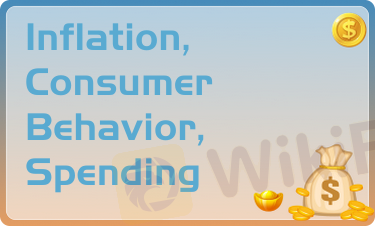
2025-02-06 06:55
업계The roles of the central bank in managing inflatio
#firstdealofthenewyearastylz
The impact of inflation on consumer behavior is a crucial topic in economics that examines how rising prices influence the decisions and actions of consumers. Here’s a full discussion on it:
1. Understanding Inflation: Inflation is the rate at which the general level of prices for goods and services rises, eroding purchasing power. When inflation occurs, consumers find that their money does not stretch as far as it once did, leading to changes in spending habits.
2. Changes in Spending Habits: As prices increase, consumers may prioritize essential goods and services over luxury items. For example, they might cut back on dining out or entertainment expenses and focus more on necessities like groceries and housing. This shift can lead to decreased demand for non-essential products, impacting businesses that rely on discretionary spending.
3. Impact on Savings and Investment: High inflation can also discourage saving, as the real value of money decreases over time. Consumers might feel compelled to spend their money quickly rather than save it, fearing that it will lose value. This behavior can lead to a decrease in overall savings rates and affect investment trends, as individuals may seek to invest in assets that can outpace inflation, such as real estate or stocks.
4. Consumer Confidence: Inflation can influence consumer confidence and expectations about the economy. If consumers anticipate continued price increases, they may alter their spending behavior, leading to a self-fulfilling prophecy where reduced spending can slow economic growth. Conversely, if inflation is perceived as temporary, consumers may be less likely to change their habits significantly.
5. Long-Term Effects: Over the long term, persistent inflation can lead to structural changes in the economy. Businesses may adjust their pricing strategies, and wage negotiations may shift as workers demand higher pay to keep up with rising costs. This can create a cycle of inflation that is difficult to break, affecting overall economic stability.
In conclusion, inflation has a profound impact on consumer behavior, influencing spending habits, savings, investment decisions, and overall economic confidence. Understanding these dynamics is essential for businesses and policymakers to navigate the challenges posed by inflation effectively.
좋아요 0

Monix
โบรกเกอร์
인기있는 콘텐츠
시장 분석
투자주체별매매 동향
시장 분석
유로존 경제 쇠퇴 위기 직면
시장 분석
국제 유가는 어디로
시장 분석
미국증시 레버리지(Leverage)·인버스(Inverse)형의 ETF, 최근 사상 최대 신
시장 분석
투기장 된 원유 ETL...첫 투자위험 발령
시장 분석
RBNZ 양적완화 확대
포럼 카테고리

플랫폼

전시회

IB

모집

EA

업계

시세

인덱스
The roles of the central bank in managing inflatio
 홍콩 | 2025-02-06 06:55
홍콩 | 2025-02-06 06:55#firstdealofthenewyearastylz
The impact of inflation on consumer behavior is a crucial topic in economics that examines how rising prices influence the decisions and actions of consumers. Here’s a full discussion on it:
1. Understanding Inflation: Inflation is the rate at which the general level of prices for goods and services rises, eroding purchasing power. When inflation occurs, consumers find that their money does not stretch as far as it once did, leading to changes in spending habits.
2. Changes in Spending Habits: As prices increase, consumers may prioritize essential goods and services over luxury items. For example, they might cut back on dining out or entertainment expenses and focus more on necessities like groceries and housing. This shift can lead to decreased demand for non-essential products, impacting businesses that rely on discretionary spending.
3. Impact on Savings and Investment: High inflation can also discourage saving, as the real value of money decreases over time. Consumers might feel compelled to spend their money quickly rather than save it, fearing that it will lose value. This behavior can lead to a decrease in overall savings rates and affect investment trends, as individuals may seek to invest in assets that can outpace inflation, such as real estate or stocks.
4. Consumer Confidence: Inflation can influence consumer confidence and expectations about the economy. If consumers anticipate continued price increases, they may alter their spending behavior, leading to a self-fulfilling prophecy where reduced spending can slow economic growth. Conversely, if inflation is perceived as temporary, consumers may be less likely to change their habits significantly.
5. Long-Term Effects: Over the long term, persistent inflation can lead to structural changes in the economy. Businesses may adjust their pricing strategies, and wage negotiations may shift as workers demand higher pay to keep up with rising costs. This can create a cycle of inflation that is difficult to break, affecting overall economic stability.
In conclusion, inflation has a profound impact on consumer behavior, influencing spending habits, savings, investment decisions, and overall economic confidence. Understanding these dynamics is essential for businesses and policymakers to navigate the challenges posed by inflation effectively.
좋아요 0
나 도 댓 글 달 래.
제출
0코멘트

댓글이 아직 없습니다. 첫 번째를 만드십시오.

제출
댓글이 아직 없습니다. 첫 번째를 만드십시오.